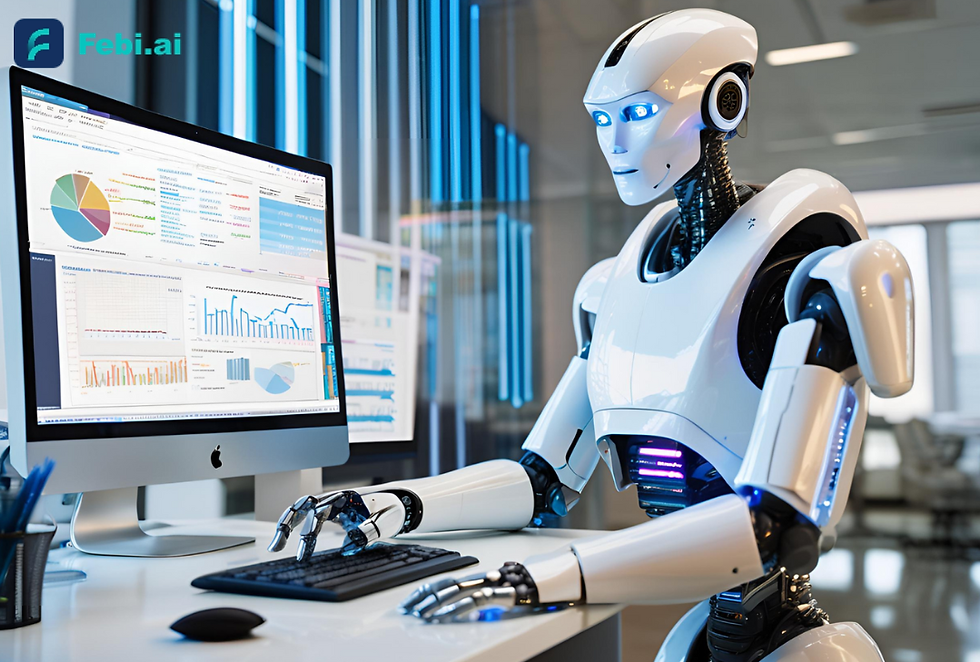The Role of AI and Automation in Accounting: Enhancing Invoice Verification and Financial Management
- Riya Aggarwal

- Feb 25, 2025
- 4 min read
The field of accounting has evolved significantly with the integration of artificial intelligence (AI) and automation technologies. Businesses are increasingly leveraging these innovations to streamline operations, enhance accuracy, and improve financial management. Among the key areas transformed by these advancements are the invoice verification process, financial automation, and AI-driven accounting solutions.

This article explores the financial automation benefits, the benefits of artificial intelligence in accounting, how AI for accounting questions is reshaping financial decision-making, and the importance of accounting platforms in modern business environments.
Understanding the Invoice Verification Process
The invoice verification process is a critical function in accounting that ensures businesses pay for goods and services accurately and on time. Traditionally, this process involved manual checking of invoices against purchase orders and delivery receipts. However, with automation and AI, businesses can now optimize invoice verification, reducing errors and processing time.
Steps in the Invoice Verification Process
Invoice Receipt: The business receives an invoice from a supplier.
Validation: AI-driven software checks invoice details against purchase orders and delivery receipts.
Error Detection: Automation flags discrepancies, such as incorrect pricing or unauthorized charges.
Approval Workflow: The system routes verified invoices to the finance department for payment approval.
Payment Processing: Approved invoices are processed for payment through integrated accounting platforms.
Financial Automation Benefits
Financial automation has become a game-changer in modern accounting, offering numerous advantages for businesses of all sizes. Here are some of the key financial automation benefits:
1. Increased Accuracy
Manual financial processes are prone to errors, which can lead to costly mistakes. Automation eliminates human error by ensuring accurate data entry, reconciliation, and reporting.
2. Time Efficiency
Automated systems handle repetitive accounting tasks, such as invoice verification, expense tracking, and payroll processing, significantly reducing the time spent on manual work.
3. Cost Savings
By reducing the need for manual labor, businesses save on administrative costs. Additionally, automation minimizes the risk of financial losses due to errors or fraud.
4. Real-Time Data Insights
Financial automation provides real-time access to financial data, allowing businesses to make informed decisions quickly and efficiently.
5. Regulatory Compliance
Automation ensures that financial transactions comply with tax regulations and accounting standards, reducing the risk of non-compliance penalties.
Benefits of Artificial Intelligence in Accounting
AI is transforming accounting by providing advanced analytical capabilities and automating complex financial tasks. The benefits of artificial intelligence in accounting include:
1. Automated Data Entry and Reconciliation
AI-powered tools can extract data from invoices, receipts, and bank statements, eliminating manual data entry and reducing errors in reconciliation.
2. Fraud Detection and Prevention
Machine learning algorithms analyze financial transactions to detect unusual patterns that may indicate fraudulent activities, improving security measures.
3. Smart Financial Forecasting
AI can analyze historical financial data and predict future trends, helping businesses plan budgets and investments more accurately.
4. AI-Powered Chatbots for Accounting Questions
AI chatbots can answer common AI for accounting questions, assisting accountants and business owners in real-time with financial queries and problem-solving.
5. Improved Decision-Making
AI-driven insights enable businesses to make data-driven decisions, optimizing financial performance and strategic planning.
AI for Accounting Questions: How AI is Transforming Financial Advisory
With the increasing complexity of financial regulations and business operations, AI is playing a crucial role in answering AI for accounting questions through intelligent automation and virtual assistance.
1. AI Chatbots for Financial Guidance
AI-driven chatbots can answer frequently asked accounting questions, such as tax calculations, expense categorization, and financial compliance.
2. AI-Powered Financial Analytics
AI systems analyze large volumes of financial data to provide accurate insights into business performance and areas of improvement.
3. Tax and Audit Assistance
AI tools help businesses navigate tax laws, audit requirements, and financial reporting standards with ease.
The Role of Accounting Platforms in Financial Automation
Modern accounting platforms integrate AI and automation to enhance financial management, making them indispensable for businesses today.
1. Cloud-Based Accounting Solutions
Cloud-based accounting platforms allow businesses to access financial data from anywhere, facilitating remote work and collaboration.
2. Seamless Integration with Financial Tools
Accounting platforms integrate with payment gateways, banking systems, and tax software, streamlining financial processes.
3. Real-Time Reporting and Dashboards
Businesses can generate real-time financial reports and dashboards, providing valuable insights for decision-making.
4. Customizable Features for Businesses
Accounting platforms offer customizable modules for invoicing, payroll, tax management, and financial analysis, catering to specific business needs.
Conclusion
The adoption of AI and automation in accounting is revolutionizing the industry by improving efficiency, accuracy, and decision-making. The invoice verification process has become more streamlined, reducing manual errors and processing times. The financial automation benefits extend beyond efficiency, offering cost savings, regulatory compliance, and real-time insights.
Additionally, the benefits of artificial intelligence in accounting have enabled businesses to automate data entry, detect fraud, and enhance financial forecasting. AI is also transforming how businesses interact with financial information, with AI for accounting questions providing instant responses and guidance. Lastly, advanced accounting platforms continue to drive innovation in financial management by integrating cloud computing, AI analytics, and automated workflows.
For businesses looking to stay ahead in the digital era, investing in AI-powered accounting solutions and financial automation tools is no longer an option—it is a necessity.



Comments